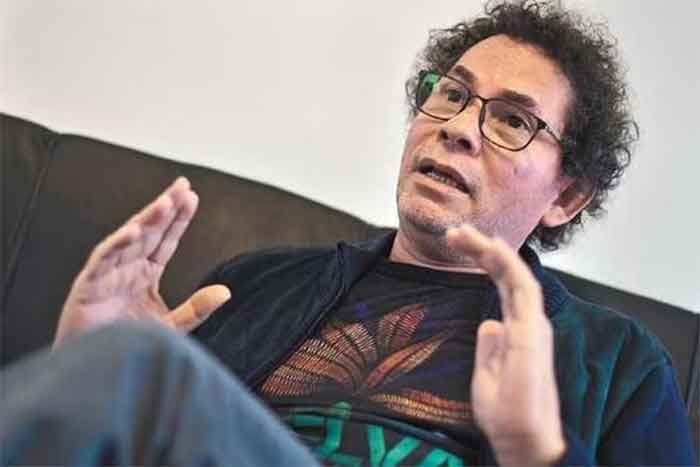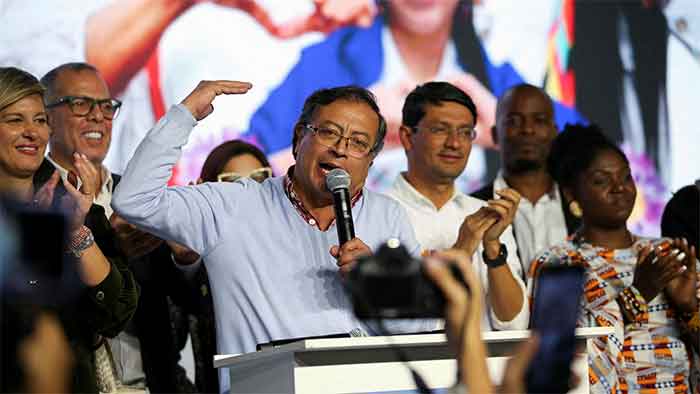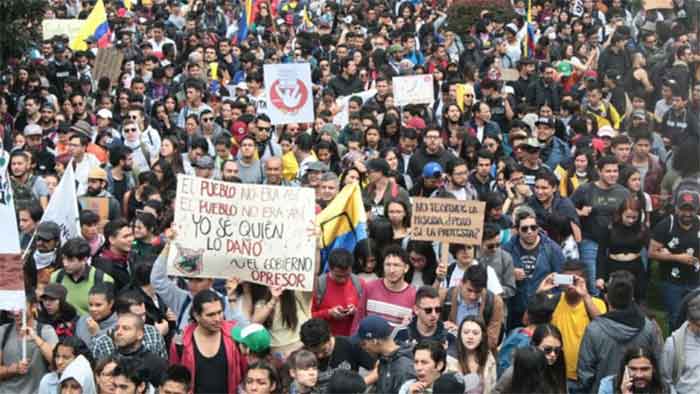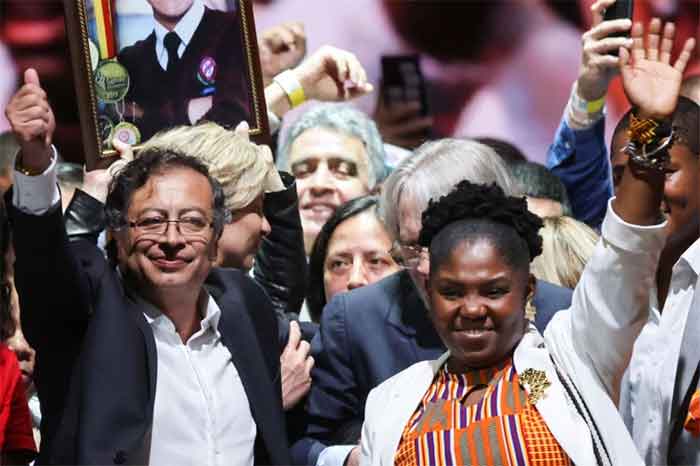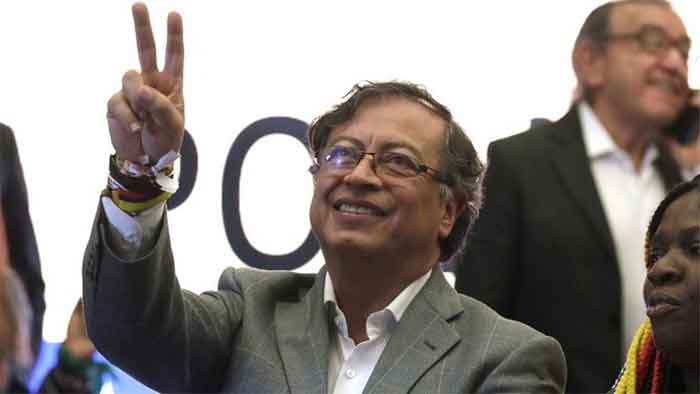
Colombia’s president-elect Gustavo Petro is wasting no time in fulfilling his promise of normalizing relations between his country and the socialist government in Venezuela, discussing with Venezuelan president Nicolás Maduro the reopening of the border between the two nations three days after winning the election.
Media reports said:
Petro, a former guerrilla who won the presidential election on Sunday promising to make big changes in Colombia, has promised to reestablish diplomatic ties with Venezuela, which were interrupted when Bogotá decided to recognize opposition leader Juan Guaidó as the legitimate president of the neighboring country, along with the U.S. and about 50 other nations.
On Wednesday, Petro made it clear that the change in his country’s policy towards Venezuela is soon to change. “I have reached out to the Venezuelan government to open the borders and restore the full exercise of human rights on the border,” Petro wrote on his Twitter account.
Petro’s victory raises doubts about the future relationship of the Colombian government with the Venezuelan opposition, which until now has seen Bogotá as one of its greatest allies. Colombia’s present president Ivan Duque’s support of Guaido’s movement led to the breaking of diplomatic relations between the two countries in February 2019.
The conversation about the new relationship between the two countries was confirmed by Maduro himself, who said that he took advantage of the call to congratulate Petro on his electoral victory during the weekend.
“I spoke with the elected president of Colombia, Gustavo Petro, and, on behalf of the Venezuelan people, I congratulated him on his victory. We discussed the willingness to restore normalcy at the borders, various issues about peace and the prosperous future of both peoples,” Maduro said on Twitter.
The border’s opening had also been promised by Petro’s rival, the independent businessman Rodolfo Hernández, who narrowly lost on Sunday.
Petro, who will be sworn in Aug. 7, said he plans to “restore the full exercise of human rights on the border.”
The move is the deepest diplomatic change planned by Petro so far, as the leftist leader looks to re-make foreign policy in Latin America’s closest U.S. ally. Diplomatic ties with Venezuela were severed in 2019 after Colombia joined the U.S. in recognizing opposition leader Guaido as Venezuela’s interim leader.
U.S. President Joe Biden also congratulated Petro on his victory this week, reaffirmed his support for Colombia and said he welcomes the chance to discuss security and counter-narcotics.
Colombia’s current President Ivan Duque has an acrimonious relationship with Maduro. The two have never held an official meeting and regularly exchanged barbs on social media and television broadcasts.
The 2,200-kilometer (1,380-mile) Colombia-Venezuela border used to be of great importance for both economies. Venezuela was Colombia’s biggest trading partner after the U.S., and largest export market for its manufacturing and agricultural goods.
There was a partial re-opening of trade in October. Last year Colombia exported just $331 million of goods to Venezuela, down from $6.1 billion in 2008. Nearly two million Venezuelans have fled to Colombia in recent years to escape economic hardship at home.
The closure of official border crossings led to a surge in contraband over informal routes controlled by organized crime.
Colombia’s ELN Open To Peace Talks With Petro
A Reuters report said:
Colombian leftist guerrilla group the National Liberation Army (ELN) is open to advancing peace talks with the incoming government of president-elect Gustavo Petro, it said on Monday, and called for reforms to tackle social exclusion and inequality.
Leftist Petro and his vice president-elect, Francia Marquez, won 50.4% of the vote in Sunday’s election.
“The ELN remains active in its fight and political and military resistance, but also its disposition to advance in a peace process to further talks which started in Quito in February 2017,” the ELN said in a statement.
Petro has pledged to fully implement the 2016 peace deal with the former Revolutionary Armed Forces of Colombia (FARC) guerrilla group and to seek talks with the still-active ELN rebels.
The incoming president, a former member of the M-19 guerrilla group, has called for a rapid negotiation with the ELN, and has also suggested applying the 2016 peace deal with the demobilized FARC to those combatants who reject the agreement and formed dissident groups.
If Petro promotes changes to overcome political violence and develops plans for employment and entrepreneurship, agrarian reform, and continuity of the peace process, among others, he will have popular support, the ELN said. The group called for expanding economic inclusion for Colombia’s marginalized communities.
Peace talks between previous governments and the ELN did not advance due to the group’s radical positions, a diffuse chain of command and dissent in its ranks.
The ELN, which has some 2,400 fighters, began peace talks with the previous government of former president Juan Manuel Santos, but negotiations fell apart after a car bombing in Bogota, while current president Duque demanded that the group release all its hostages.
The ELN, founded by radical Roman Catholic priests in 1964, is widely considered to be less centrally controlled than FARC was.
Petro Promises To Fight Inequality
Another Reuters report said:
The third time was the charm for Gustavo Petro, the leftist firebrand, former guerrilla and newly elected Colombian president who credits his political awakening to seeing his father weep over the death of revolutionary Che Guevara.
The 62-year-old senator and former mayor of capital Bogota, jailed for his youthful role in the M-19 guerrilla group, won 50.4% of votes in a close vote on Sunday, beating the populist business magnate Rodolfo Hernandez, who got 47.3%. He had also run for the presidency in 2010 and 2018.
“A youth wave decided today to take over the ballot box, a wave of women decided today to take the ballot box,” Petro told supporters on Sunday evening.
Petro has promised to address profound social and economic inequality in Colombia, where around half of the population lives in some form of poverty, with free education, an ambitious fiscal reform worth some $13.5 billion, and work to protect women’s rights.
Still, while left-wing parties won some 50 seats in Congress in March legislative elections, Petro will likely be unable to pass reforms without support from centrist parties.
Petro’s victory marks a turning point in Colombia, a traditionally conservative country where successive governments have pledged to tackle insecurity and violence linked to a nearly six decade-long armed conflict.
“Colombia has never had a progressive government,” Petro told Reuters in a recent interview. “Every attempt in the last century has been condemned to violence.”
Petro, who alleges he was tortured by the military during his detention, first gained national recognition with impassioned congressional speeches about corruption and violence committed by right-wing paramilitary groups and their political allies.
He wants to hike taxes on owners of large tracts of unproductive land and start weaning Colombia off income from oil and coal, which he has described as poisons comparable to cocaine – perhaps the country’s top illegal export.
Petro was never a combatant in M-19, but has had to campaign hard against accusations he will favor former guerrillas or institute policies akin to those which have caused social and economic crisis in neighboring Venezuela.
The new president has scoffed at comparisons to Venezuelan leaders and made efforts to assuage fears among the business community.
A father of five, Petro has also pledged low-cost loans for small businesses and a redistribution of pensions to ensure casual workers get a minimum payment.
Petro has said he will shift Colombia’s relationship with top ally the U.S. away from anti-narcotics policy and toward the fight against climate change.
Members of Colombia’s armed forces are worried they will face significant changes under Petro, including a complete restructuring of the police force.

